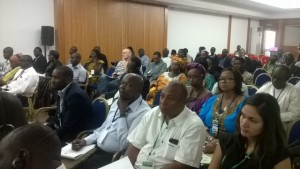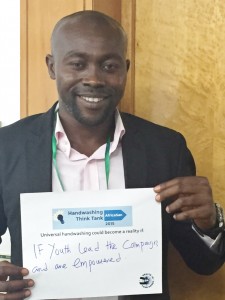Event Summary: AfricaSan 4 Day Three – Going further together
May 28, 2015
On Monday, the PPPHW Secretariat and partners began the week at AfricaSan with our Handwashing Think Tank, so it was fitting that we concluded the conference on Wednesday by delivering a session on Moving Hygiene to Scale. In the Think Tank we dived in to three big ideas in hygiene promotion and behavior change, whereas in our final session we focused on a topic that poses a specific challenge to many implementers: how to bring great handwashing programs to scale?
Our diverse government, academic, NGO, and private sector panel members brought a range of perspectives and experiences to this question. We will post their presentations shortly, but the outcomes that stood out to me in particular can be categorized in three main areas.
First, the evidence is clear that hygiene must be scaled to truly make an impact on fighting preventable diseases. But, there is more work that must be done, both in terms of advancing the evidence and making successful hygiene program scale-up the norm rather than the exception.
Second, bringing hygiene to scale requires buy-in and engagement at many different levels—including governments, community leaders, private sector organizations, NGOs and beyond. Parts of the WASH sector are very successful at working effectively in a collaborative, synergistic way. As hygiene practitioners, there is much we can learn from these colleagues.
Finally, measurement is vitally important for knowing if scale has made an impact on actual handwashing with soap behavior and correlated health outcomes. There is a key role for government to play in measuring access to functional handwashing stations in households, schools, and healthcare facilities. Governments can take a lead on this both at the national policy level and through advocating for hygiene indicators within the Post-2015 Sustainable Development Goals. In fact, regardless of whether you work for a government, a non-govenrmental organization, or a private sector company, you too can promote measurement, and we have developed tools to help you do so.
This last point on measurement was particularly salient, as Day 3 at AfricaSan4 concluded with a wrap-up session wherein the Ngor Declaration, the Ministerial commitments that are the follow-on to AfricaSan3’s eThekwini Declaration, was introduced. We were pleased that this updated declaration included mention of the importance of hygiene. Shining a spotlight on hygiene in this manner will hopefully not only increase handwashing programming implementation and hygiene integration, but also advance measurement of hygiene facilities and behaviors in Africa. Ultimately, this will not only elucidate the status of handwashing in key areas, but also help us know if we are in fact reaching the poorest, thereby eliminating inequalities and increasing dignity (two topics about which I previously wrote on Monday and Tuesday of AfricaSan4).
While enjoying one last ocean-side dinner with fellow WASH sector professionals, our chairs perched on a carpet of white shells as we watched the sun set over Dakar, I asked my companions to describe their favorite part of the conference. For me, AfricaSan4 was an essential opportunity for the PPPHW Secretariat to drive forward hygiene thinking, dialogue, and visibility. According to the response and engagement of many conference participants, we achieved all that and more. However, what I enjoyed most was the opportunity to meet practitioners and learn about their challenges, perspectives,
and innovations. We learned firsthand that the knowledge tools and resources that the PPPHW Secretariat develops are being used, modified, and distributed by those working in the field. Through the conversations and connections that we made at AfricaSan4, I have both a better understanding of the needs that face the hygiene behavior change sector as well as a clearer perspective on how the PPPHW Secretariat can continue to deliver value going forward.
Ultimately, I am positive about the outcomes from AfricaSan4. We were successful in connecting with practitioners, learning more about what our role should be going forward, and raising the visibility of hygiene amongst government and NGO participants. I think that for many of us who attended AfricaSan4, it will take a few days to digest the rich content. Part of this process for the PPPHW Secretariat will be publishing additional outcome materials, so please be on the look out for those. If you were able to attend and have your own thoughts on the context of hygiene or what you learned, please let us know.
I hope that you have enjoyed these updates as much as I have enjoyed writing them. I’m enthusiastic about where we are headed and energized by the dedicated, creative individuals who are joining us on the road to make universal water, sanitation, and hygiene a reality for all.

